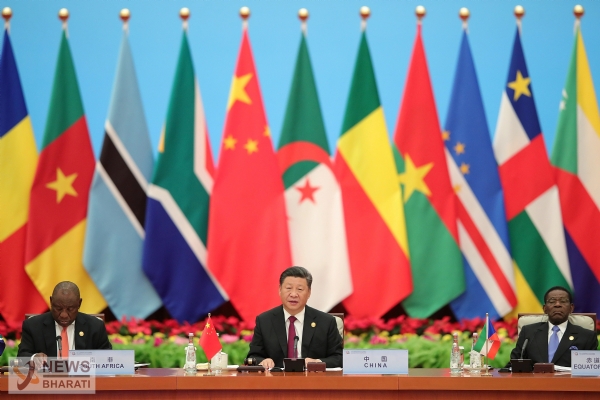China’s motivations behind peacekeeping operations in Africa
China’s active involvement in peacekeeping, especially in Africa, is motivated by many pragmatic factors like strengthening China’s soft power in Africa, providing operational experience to PLA soldiers in different situations as well as ensuring the protection of China’s huge investments in Africa.
Total Views |
China is the second largest contributor to the United Nations Peacekeeping budget and the largest contributor of personnel than any other permanent member of the United Nations Security Council. Recently, China completed 30 years of its involvement in UN peacekeeping operations and published an important White paper on this occasion in 2020. In these 30 years, China has contributed more than 40000 peacekeeping troops in over 25 countries including both combat as well as non-combat roles. Moreover, China’s President Xi Jinping pledged during the 2015 UN Leaders’ Summit, to send as many as 8000 troops to different regions under UN peacekeeping as well as to make a US$ 6 billion contribution every year.

China’s active involvement in peacekeeping, especially in Africa, is motivated by many pragmatic factors like strengthening China’s soft power in Africa, providing operational experience to PLA soldiers in different situations as well as ensuring the protection of China’s huge investments in Africa. China aims to become a ‘global security provider’ to substantiate its claim as a global major power. China is currently included in all seven peacekeeping missions undergoing in Africa either through military troops or by sending military experts and other technical officers. The threats posed by terrorism to China's strategic interests in African countries have compelled Beijing to deploy combat troops. It views Africa’s terrorist and rebel movements not only as a threat to global security but also to its economic and geopolitical interests.
China’s history of peacekeeping
Initially, China was reluctant to engage in peacekeeping operations as such missions were viewed as contradictory to China’s principle of ‘non-interference’ in the internal affairs of other countries. Even after the People's Republic of China's entry into the UN in 1971, this circumspect attitude persisted. During this period, China has largely abstained from actively communicating about peacekeeping at the UN Security Council. This view gradually changed with China’s rising need to integrate with the world in the post-Mao period. China found it increasingly challenging to adhere to the conventional, somewhat rigid understanding of the principle of non-interference.
China first sent five military officials in the UN Truce Supervision Organization in April 1990 to Namibia. By the turn of the century, China's peacekeeping force had increased significantly in absolute terms as a direct result of Beijing's embrace of a more collective security strategy. As a result, a separate Peacekeeping Affairs Office was created under the Ministry of National Defense in 2001. China’s peacekeeping engagement expanded both in scope and area coverage after this. China’s Major General Zhao Jingmin was appointed as the Force Commander of the UN Referendum Mission in Western Sahara in 2007. He became the first Chinese official to be appointed to such a high post. Additionally, China has given training to more than 2,000 peacekeepers from other nations and also provided technical support to peacekeeping missions.
China’s resources security
As a country with a huge population and large economy, China’s resource security is an important factor in its foreign policy. China’s engagement in peacekeeping operations is also a part of it. For instance, China has military observers in Western Sahara, a contested territory between Algeria and Morocco, under the UN mission to conduct a referendum. It is important for China to maintain peace in this region due to the presence of huge phosphate reserves. Morocco has over 70% of global phosphate rock reserves whereas Algeria has the 4th largest deposits. In 2018, China’s CITIC constructions signed a US$ 6 billion agreement with Algeria to develop a phosphate production facility as well as a US$ 7 billion agreement to build a Tebessa fertilizer plant in 2022. In 2021, China’s Hubei Forbon Technology set up a joint venture with Moroccan company OCP to develop next-generation fertilizers using phosphate. Moreover, China also has ambitious BRI projects in both Morocco and Algeria where China wants to build a transport corridor connecting Africa to Europe. Thus, looking at China’s booming economic investments in Western Sahara and the surrounding region, China’s peacekeeping engagement, although negligible, prove to be substantial. Similarly, China’s contribution to the peacekeeping mission in Mali began in 2013 and it now contributes 413 contingent troops. Moreover, Military Operations Other Than War (MOOTW) such as in Mali, where China provides medical care and infrastructure repair, has allowed China to demonstrate its military capacity abroad in a cooperative manner, thus propagating its image as a major peaceful power. With such a presence, it has helped China to gain a major BRI partner. China has built dams and railways and Mali also acts as a platform to expand BRI in other Western African countries. These investments are facilitated by China’s presence in terms of peacekeepers. The UN mission in South Sudan has China’s largest peacekeeping team that includes both combat and non-combat personnel. South Sudan has proven reserves of 3.5 billion barrels worth of crude oil. Chinese companies have been investing in Sudan’s oil resources since the 1990s. China’s goal in South Sudan is to avoid a repetition of China’s 2011 Libya experience when Chinese companies lost most of their investments in a civil war that forced Beijing to evacuate 35,000 of its citizens in 2011. Some estimates suggest that there are more than 2 lakh Chinese workers currently working in China. Its presence in the form of peacekeeping troops makes it easier to protect its diaspora in times of crisis. Despite the ceasefire agreement between South Sudan and rebels in 2018, China still maintains a high number of troops there to protect its oil investments. According to 2020 figures, South Sudan exports almost 95% of its oil to China only. Hence, China’s oil interests in South Sudan provide a fitting example of geo-economic motivations behind China’s peacekeeping engagement in Africa.
Similarly, China’s peacekeeping engagement in the Democratic Republic of Congo is also guided by the presence of abundant cobalt and copper resources. In 2019, DRC was the largest producer of cobalt and copper. DRC accounted for almost 55% of China’s total copper imports. Moreover, DRC’s nearly 70% of the mining industry is dominated by Chinese companies today. China has been investing in the copper and cobalt mining industry of DRC’s Katanga province in the last decade. Copper, along with cobalt, zinc, lithium, and manganese are essential for the growth of China’s own electrical and electronics manufacturing which it leads on the global stage. The DRC is in need of reconstruction after decades of neglect and war. The DRC provides China an opportunity to benefit from massive infrastructure investment in roads, railways, energy, dams, river navigation, and airlines. In fact, DRC signed an MoU in January 2021 to become the 45th country to join China’s Belt and Road Initiative. Thus, DRC is important for China both from the perspective of resource security as well as a BRI partner.
Conclusion
As one of the most significant contributors to UN peacekeeping missions in terms of troops as well as finances, China’s peacekeeping policy certainly has global ramifications. China’s peacekeeping engagement in Africa allows China to fulfill other geostrategic motives. Peacekeeping engagement is an influential tool for China to achieve its stated as well as its hidden objectives. It has improved China’s image as a security provider at least among African countries and helped China to present its case of ‘peaceful rise’. However, it is important for other countries to carefully assess China’s engagement in peacekeeping and ensure that it does not provide an undue advantage to China to fulfill its geostrategic motives at the cost of peace in Africa.


